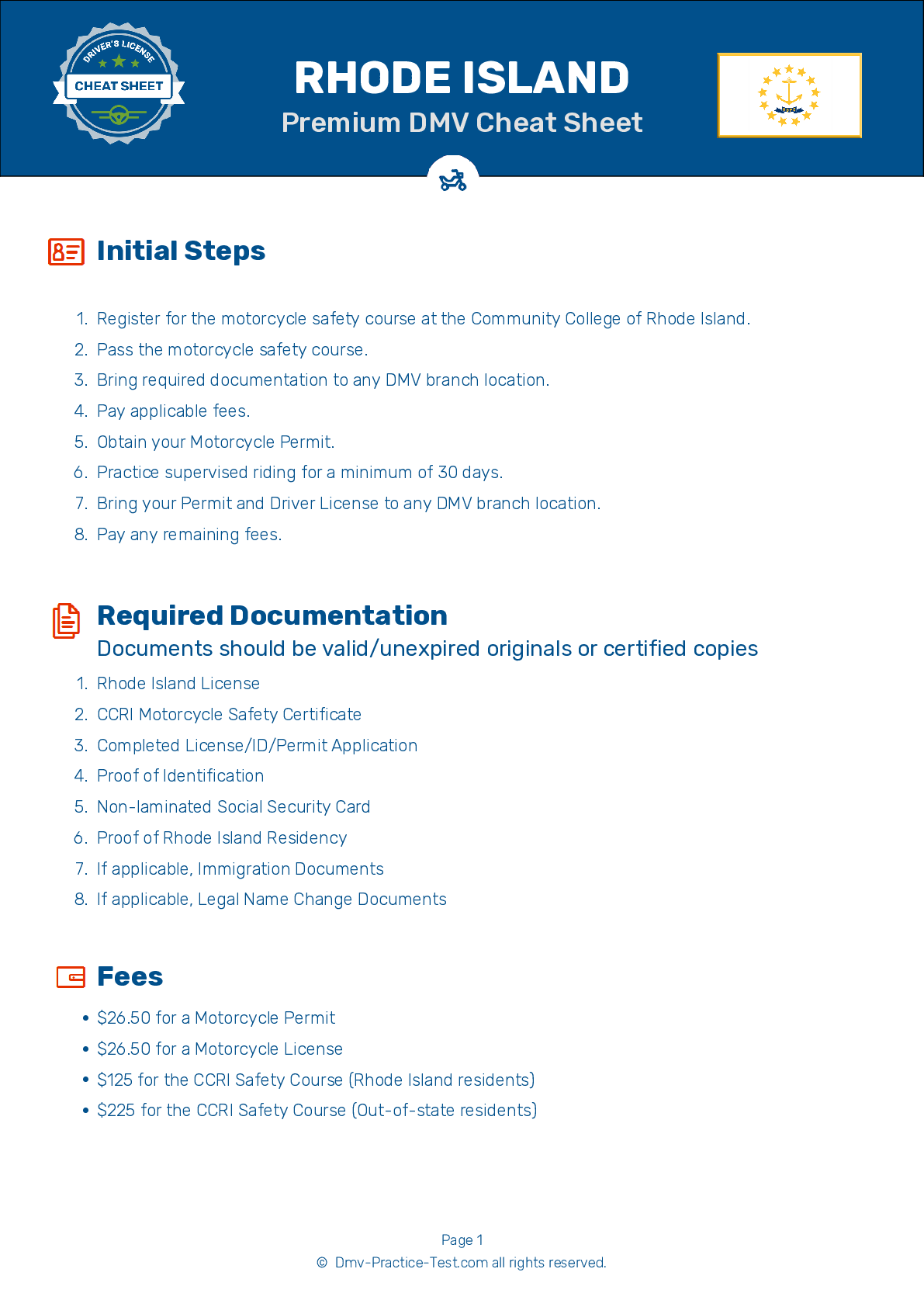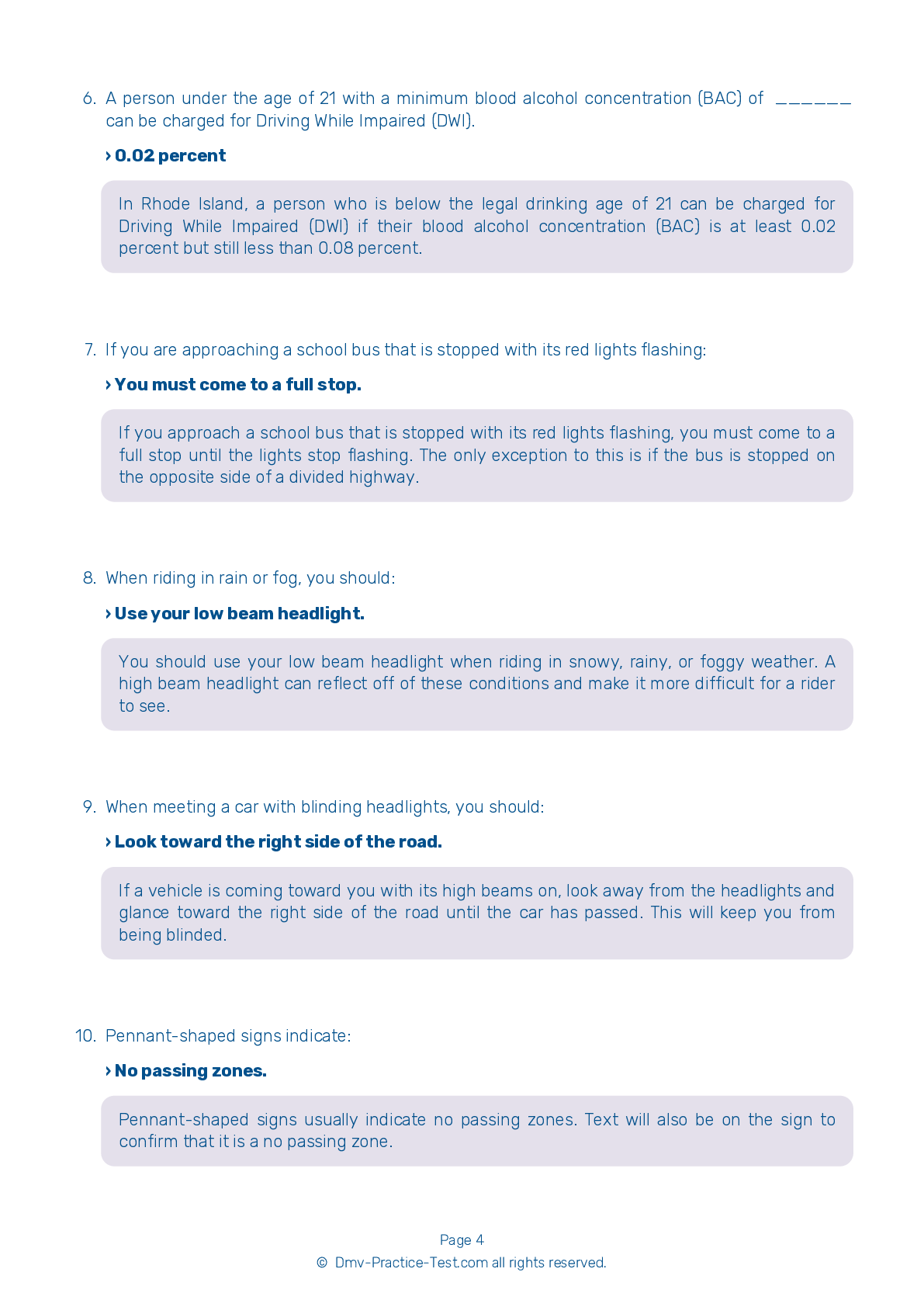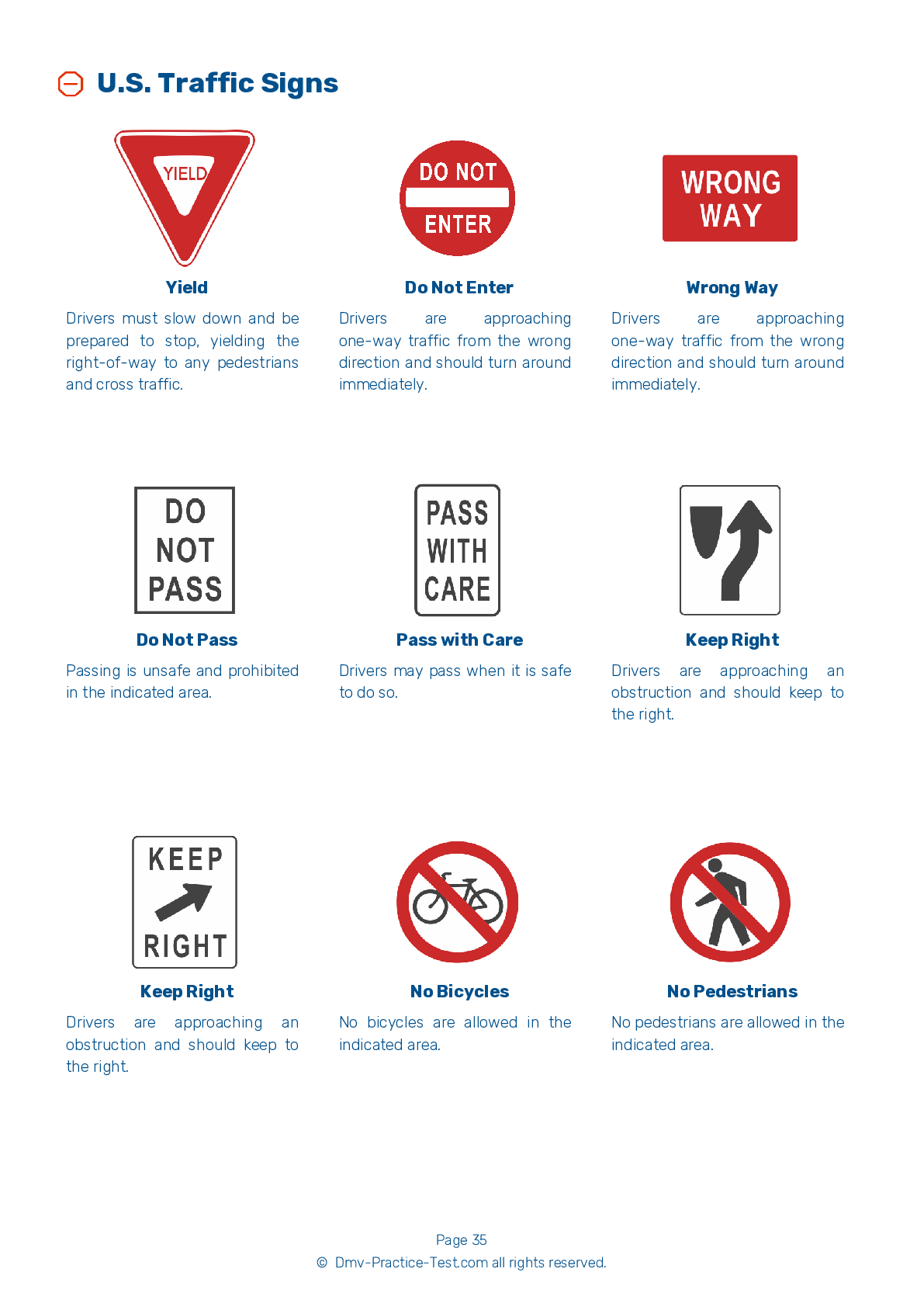DMV Permit Test #7
Motorcycle Test | License RI 2026 | FREE Online Practice! #7 Page 3 of 4
Take this FREE motorcycle test (license in RI 2026) to check your knowledge of the road rules. To improve your results, download a motorcycle handbook online, study theory, and practice for free on our website. Still worried about how to get a motorcycle license in Rhode Island in 2026? Check our website for more sample tests, train as much as possible, and boost your grades!
25
20
16
13 . A passenger on a motorcycle should:
Hold onto the seat.
Passengers should get on a motorcycle only after the engine has been started and the transmission is put in neutral. They should sit as far forward as possible without hindering the operator's control of the motorcycle and should hold onto the operator's waist, hips, or belt.
14 . Which of the following is not a type of protective riding gear?
Pants made of a soft material
Appropriate protective gear for motorcycling includes a jacket and pants made of leather or another sturdy material; footwear that covers and supports your ankles; and hearing protection, even if you wear a helmet.
15 . When meeting a car with blinding headlights, you should:
Dim your light and speed up to pass quickly.
If a vehicle is coming toward you with its high beams on, look away from the headlights and glance toward the right side of the road until the car has passed. This will keep you from being blinded.
16 . This sign means:

The bridge ahead may be too narrow to meet or pass a truck.
Warning signs are used to warn drivers about upcoming hazardous conditions and are usually yellow with black markings. This sign warns drivers that an upcoming bridge may be too narrow to meet or pass a truck and that they should be careful.
17 . Passengers should:
Hold onto their seat.
Before riding while carrying a passenger, you should instruct your passenger to lean with you through turns and curves. They should hold onto your waist, hips, or belt.
18 . Helmets are:
Never required.
A properly-worn helmet can reduce or prevent head injuries. Rhode Island law requires motorcycle passengers to wear helmets. Motorcycle operators who are under the age of 21, or who have held their license for less than a year, must wear a helmet while riding.
2026 Rhode Island | Frequently Asked Questions
To acquire a motorcycle driver's license in Rhode Island, you must first apply for a motorcycle learner's permit at the DMV. After holding the permit for 30 days, you can take the skills test. If you pass, you'll be issued a motorcycle license. For those under 21, completion of a motorcycle training course is mandatory before taking the skills test.
In Rhode Island, the minimum age to obtain a motorcycle driver's license is 16 years old. However, applicants under 18 years old must complete a state-approved motorcycle safety course. They also need parental consent and must hold a motorcycle permit for at least 30 days before taking the motorcycle road test.
Yes, you need a dedicated license to ride a motorcycle in Rhode Island. You can get a motorcycle endorsement on your current driver's license or apply for a separate motorcycle license. Both require passing a written test and a skills test. If you successfully complete an approved motorcycle training course, these tests may be waived.
To apply for a motorcycle driver's license in Rhode Island, you'll need several documents. These include proof of identity (like a birth certificate or passport), proof of Social Security number, and proof of Rhode Island residency. If you're under 18, you'll also need a Certificate of Parental Consent. Additionally, if you've completed a motorcycle training course, bring the completion certificate.
Yes, you will need to take a written exam to get a motorcycle license in Rhode Island. The written test covers motorcycle operation, safety rules, and Rhode Island traffic laws. If you successfully complete a state-approved motorcycle training course, you may be eligible to waive this written test.
The motorcycle written test in Rhode Island covers various subjects related to motorcycle safety and operation. Topics include road signs and signals, traffic laws, safe riding practices, handling emergencies, and motorcycle maintenance. The questions are designed to ensure you have the knowledge necessary to operate a motorcycle safely on public roads.
Yes, in Rhode Island, you can substitute the written test with a motorcycle training course. By successfully completing an approved motorcycle training course, you can bypass the written and on-cycle skills tests at the DMV. The course provides both classroom instruction and practical hands-on training, ensuring you're well-prepared for safe riding.
To enroll in a motorcycle training course in Rhode Island, you need to find a state-approved provider. Once you've chosen a provider, you can register for the course online or in person. Registration often requires payment upfront. The course will include both classroom instruction and practical training. Upon completion, you may be eligible for a waiver for the state's motorcycle license test.
No, you don't need to own a motorcycle for the license test in Rhode Island. You can use any motorcycle that is registered, insured, and meets all safety requirements. However, you should be comfortable riding it since you'll need to demonstrate your ability to control and handle it safely during the test.
Yes, you can use a friend's motorcycle for the driver's license evaluation in Rhode Island. The motorcycle must be registered, insured, and meet all safety requirements. Be sure you're comfortable riding it, as you'll need to demonstrate control and safe handling during the test. Always wear a helmet and protective gear during the evaluation.
Yes, in Rhode Island, the motorcycle driving exam tests specific handling skills. These include the ability to start and stop, turn and swerve, accelerate and decelerate smoothly, and balance the motorcycle. Also tested is the rider's understanding of Rhode Island traffic laws, ability to recognize and react to hazards, and basic knowledge of motorcycle operation.
Yes, Rhode Island imposes limitations on new motorcycle drivers. If you're under 21, you must complete a motorcycle training course. New drivers are also required to hold a motorcycle learner's permit for at least 30 days before taking the skills test for a license. Always check with the Rhode Island DMV for the most current rules and regulations.
Yes, your Rhode Island motorcycle license permits you to ride a motorcycle in other states. It's important to note, however, that you must abide by the traffic laws of the state you are in. Some states may have different motorcycle laws and regulations, so it's advisable to familiarize yourself with these before traveling.
Yes, in Rhode Island, it is mandatory for all motorcycle operators and passengers to wear a helmet. This law is in place to ensure the safety of all individuals involved. Helmets must meet the standards set by the Federal Motor Vehicle Safety Standard 218.
In Rhode Island, there's a single type of motorcycle license, but you can add a motorcycle endorsement to your regular driver's license. If you're 16 or 17, you can get a limited provisional motorcycle license. Always check with the Rhode Island Division of Motor Vehicles for the most accurate and current regulations.
Yes, you can add supplementary endorsements to your motorcycle license in Rhode Island. These endorsements signify different types of vehicles you are licensed to operate. For instance, a "3" endorsement allows you to operate a motorcycle. To add an endorsement, you must pass the relevant tests and pay any associated fees. Contact your local DMV for more information.
Yes, in Rhode Island, the motorcycle license test is offered in multiple languages beyond English. The Department of Motor Vehicles (DMV) aims to accommodate diverse applicants. However, it's best to contact your local DMV office directly to confirm the available languages for the test.
To effectively prepare for the motorcycle license test in Rhode Island, thoroughly study the Rhode Island Motorcycle Operator Manual. It covers all the information you'll need to know. Practice with online sample tests to get familiar with the format. Also, consider taking a motorcycle safety course; it provides practical training and can help you feel more confident.
Yes, the Rhode Island Division of Motor Vehicles provides the written motorcycle exam in several languages other than English. These include Spanish, Portuguese, and others. However, it's advisable to contact your local DMV office ahead of time to confirm the availability of the test in your preferred language.
If you don't pass the motorcycle written test in Rhode Island on your first attempt, you are allowed to retake it. However, you must wait a minimum of five days before retesting. It's recommended to review the Rhode Island Motorcycle Manual thoroughly before retaking the test to improve your chances of passing.



